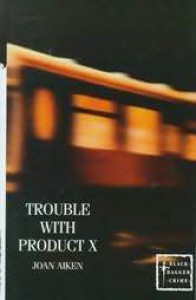The Trouble With Product X
 Joan Aiken (1924-2004) began her writing career with YA fiction as a 16-year-old contributor for the BBC Children's Hour. Aiken's efforts at mysteries and suspense novels won her an Edgar Award for Best Young Adult Novel (Night Fall) in 1972. The same touch of the quirky, whimsical inventiveness in her writing for young people often found its way into her adult crime fiction. She once said, "Stories are like butterflies, which come fluttering out of nowhere, touch down for a brief instant, may be captured, may not, and then vanish into nowhere again."
Joan Aiken (1924-2004) began her writing career with YA fiction as a 16-year-old contributor for the BBC Children's Hour. Aiken's efforts at mysteries and suspense novels won her an Edgar Award for Best Young Adult Novel (Night Fall) in 1972. The same touch of the quirky, whimsical inventiveness in her writing for young people often found its way into her adult crime fiction. She once said, "Stories are like butterflies, which come fluttering out of nowhere, touch down for a brief instant, may be captured, may not, and then vanish into nowhere again."Trouble with Product X (aka Beware of the Bouquet) dates from 1966 and is one of the author's earlier novels for adults. Product X is a new perfume to be manufactured by a small company aiming to go upmarket. The ad agency hired to handle the promotion is Salmon & Bucknell, including employee Martha Gilroy, who suggests shooting a television commercial in the same remote Cornish castle where she spent her honeymoon—before her husband had a nervous breakdown and left her.
Another bad idea is to use the beautiful young Italian wife of the client as a model, as it soon becomes clear she's at the heart of a conspiracy regarding the origin of Product X. The remote TV shoot soon turns into a parade of nightmares and intrigue, including the kidnapping of a baby; monks who oppose the filming and one particularly mysterious monk who Martha thinks she recognizes; a venomous spider mailed as a "gift"; exploding soup cans; and an assortment of gothic thrills and chills that will please fans of Mary Stewart.
As The Telegraph said in Aiken's obituary, you could usually count on "slightly scatty but independent-minded young women who end up marrying slightly scatty but charming young men. Mysterious, corridor-ridden Gothic houses figure prominently, along with a variety of curses and enchantments. And there is always a strong sense of right and wrong." Although bits of that formula are present in Product X, so too is Aiken's trademark humor:
"I spent a moment or two wondering where the devil I was, who the devil I was, in a weak and lackadaisical way...My mind wobbled about like a half-set jelly, full of unrelated fragments: the address of a man I'd meant to write to about detergents before coming down to Cornwall, lines from Twelfth Night, the fact that my library subscription needed renewing, a series of slogans for Bom which I'd been trying to hatch on the way down. 'Whether you're coming or going, mending or mowing, scything or sewing, reading or rowing...you need Bom, the meat'n milk drink, made from pure fresh milk and lean juicy beef. Bom, tiddly, om BOM!' I can't offhand think of any nastier beverage than Bom, but at that moment, I felt hazily that I might even have accepted a cup of the stuff if someone had offered it to me, hot."
Martha tends to muse perhaps a bit too much on Bom promotions while she's in the midst of danger, but ultimately she proves to be an insightful sleuth, even as she fights her feelings for her ex and for a fellow employee who seems to be taking a suspiciously keen interest in the client's beautiful wife. The plot isn't so much a whodunit as a pleasant modern (albeit 1960s) Gothic romp.



